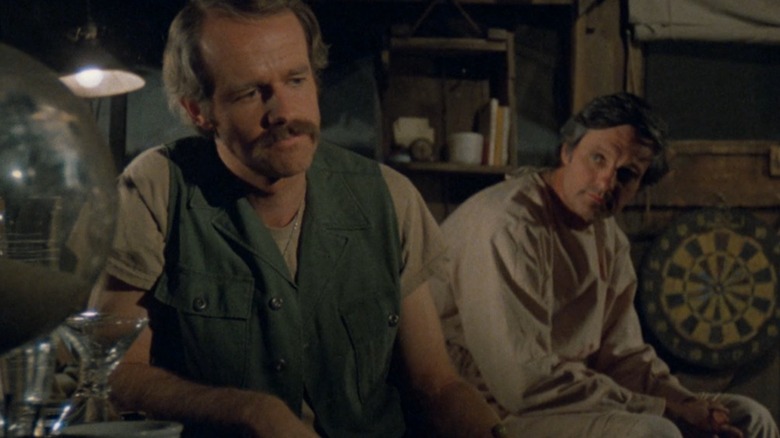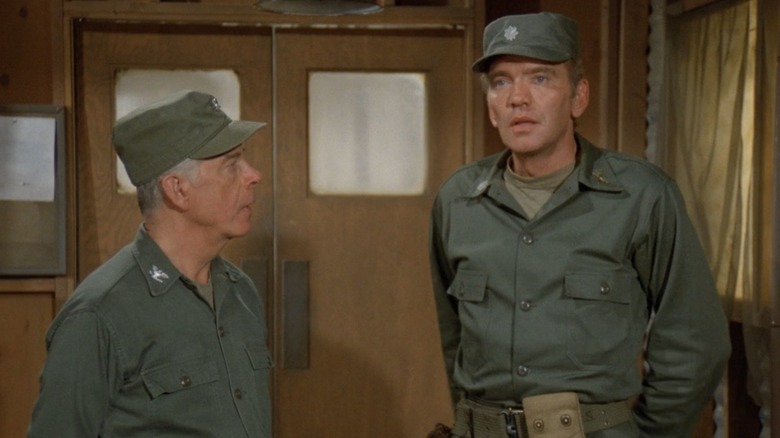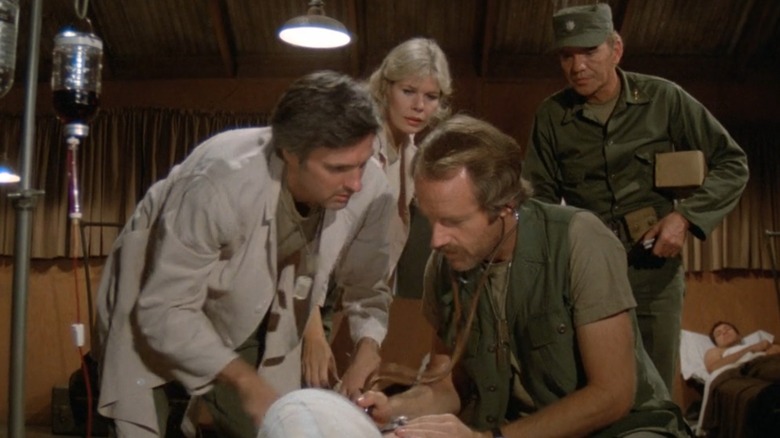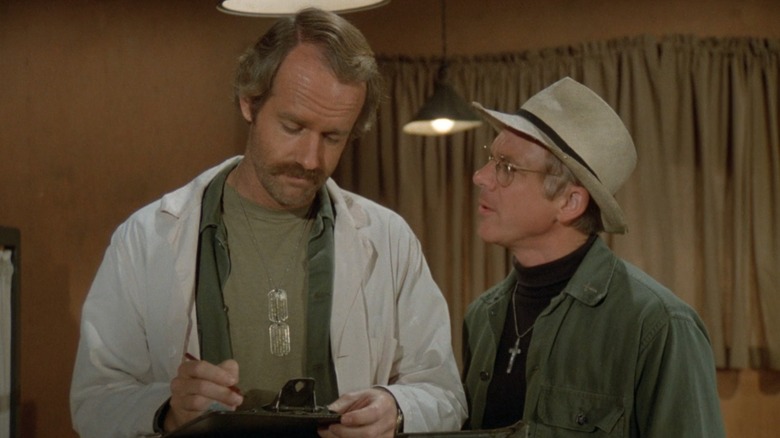The Medically Unethical M*A*S*H Scene Mike Farrell Made A Stink About
Five decades ago, "M*A*S*H" all but invented the TV dramedy. There had been a few shows before the hit wartime sitcom that straddled the line between inspiring laughter and tears, and there would be plenty more after, but few have ever mixed the two seemingly contradictory genres as perfectly as "M*A*S*H" did.
Across its eleven seasons, the members of the 4077th Mobile Army Surgical Hospital partook in plots both side-splittingly funny — prank wars! Traveling long johns! Rib cravings! — and heart-wrenchingly somber. Through both its funniest moments and its darkest, the show adhered to a strong anti-war attitude, frequently focusing on the senseless loss of armed conflict and the zealous, jingoistic leaders who let it happen.
One such episode is "Preventative Medicine," a season 7 outing in which Hawkeye (Alan Alda) decides to medically sideline a bloodthirsty front-line commander who has a disturbingly high casualty rate. Over the course of the episode, it becomes clear that the visiting Lieutenant Colonel Lacy ("The Private Files of J. Edgar Hoover" actor James Wainwright) is reckless at best and murderous at worst, pushing his soldiers into unsafe positions to achieve the most minor victories. It's a habit Hawkeye and B.J. (Mike Farrell) can't abide, and one they plan to put a stop to — by coming up with an excuse to get him in a hospital bed. In an interview with AARP Magazine for the show's 50th anniversary, though, Farrell revealed that he successfully argued with series writers to change his character's actions in the episode.
One planned plot rang false to Farrell
Among other things, "M*A*S*H" is famous for its table reads, apparently collaborative affairs after which writers would take direct input from the actors who knew their characters inside and out. In an episode of Alan Alda's "Clear+Vivid" podcast earlier this year, Farrell and Alda reminisced about the "M*A*S*H" writers' talent, with Alda noting that "[one] thing that would happen at our table reads is after we read it, we'd talk with the writers and producers about how we felt about it." The same apparently held true for "Preventative Medicine," but when it came time for feedback, Farrell was adamant that the more by-the-book B.J. wouldn't participate in the unnecessary appendectomy that Hawkeye has planned for Lieutenant Colonel Lacy.
"They wrote a story based on research they had done with actual people in the M*A*S*H situation, about this pair of doctors that found a real gung-ho officer who was sending his kids out to get killed and was glorifying himself in the process," Farrell recalled. "So the doctors took his appendix out even though he didn't have appendicitis — just to get him off the line for a while." Though the idea of performing surgery on a healthy patient sounds extreme, it's exactly the sort of thing Hawkeye's noble anarchist would do if it meant saving lives. The episode does its due diligence showing exactly who they might be saving, too, as it includes a scene in which Lacy attempts to give his men Purple Hearts and they respond with disgust and, in one case, enough panic to cause a cardiac arrest.
Do no harm?
Still, despite the extreme situation, Farrell felt B.J. wouldn't perform an appendectomy under false pretenses. "B.J. and Hawkeye decide they're going to take this guy's appendix out even though he's perfectly healthy," he told AARP. "I said B.J. wouldn't do that. That's against medical ethics." Apparently, the episode was based on true events, and writers pushed back, saying, "'But it happened.'"
According to Farrell, he stood by his understanding of the character, responding, "I'm not arguing that, I'm just saying B.J. wouldn't do it." After what Farrell estimates was about a half hour of discussion, series producer Burt Metcalfe decided that the actor's feedback actually led to a more interesting storyline anyway. According to Farrell, he said, "'You know what, we got a better script here in this discussion than we do on this page.'"
"So they changed it," Farrell concluded. In the end, "Preventative Medicine" became a bittersweet take on futility in the face of power, as B.J. sat out the surgery, Hawkeye went through with it, and neither act staunched the flow of wounded patients arriving in the medical tent. "You treated a symptom," B.J. tells Hawk wearily, while "the disease goes merrily on."
A human moment
Though its plot is rather extreme, "Preventative Medicine" is classic "M*A*S*H." It's shot through with complicated moral conviction, both from B.J., who sees this act as a violation of the Hippocratic oath, and Hawkeye, who thinks allowing Lacy to continue at his normal pace is a recipe for preventable harm in itself. "That was what was so great about the show," Farrell told AARP, referencing Metcalfe's decision to change the script. He went on: "They understood that we understood the characters that we were creating. They had the class to listen and give us the dignity of understanding that we had invested parts of ourselves in these characters."
It's one of countless stories from the "M*A*S*H" writers' rooms that demonstrates the value of behind-the-scenes communication and connection when it comes to making TV – something that Farrell touched on explicitly when discussing AI-generated scripts with Alda on "Clear+Vivid." "I understand [AI bots] can parrot the human mind," the actor noted, "but I can't imagine that they can ever come close to parroting the human spirit." But people like Alda, Farrell, Metcalfe, and episode writer Mitch Markowitz don't have that problem, and neither does "M*A*S*H." It's a show defined by its humanity, from its first moments to its last to every appendectomy in between.



